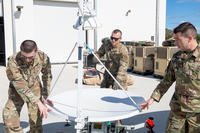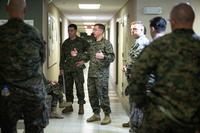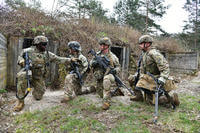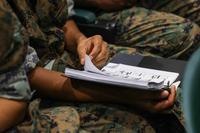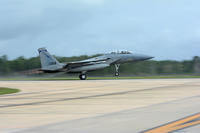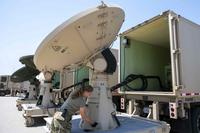U.S. Army Gen. John F. Campbell, commander of U.S and NATO troops in Afghanistan, hailed the presidential power-sharing agreement announced Sunday as a major step toward clearing the way for a continued presence of U.S. and allied forces next year.
In a statement, Campbell congratulated Afghan President-elect Ashraf Ghani Ammadzai and rival Abdullah Abdullah on the deal to form a National Unity Government. Both candidates have committed to keeping coalition forces in Afghanistan.
Campbell also praised the Afghan National Security Forces for remaining neutral during the long and bitter dispute over the presidential election results.
"Their achievements, through two elections and protracted political uncertainty, are enormous," Campbell said in an email to Military.com. "We remain committed to assisting the Afghan National Security Forces as they continue to serve and secure the Afghan people."
Following announcement of the agreement, retired Adm. James Stavridis, the former NATO commander, tweeted that the pledges of Ghani and Abdullah to work together would translate into "a Bilateral Security Agreement to keep a residual force and avoid the mistakes of Iraq."
In a statement, NATO Secretary General Anders Fogh Rasmussen urged Ghani and Abdullah to come to "the conclusion of the necessary security agreements with the United States and NATO as soon as possible."
For more than a year, the allies have been pressing for a Bilateral Security Agreement (BSA) with the U.S. to keep troops in Afghanistan past the end of this year and a similar agreement with NATO, but current President Hamid Karzai refused to sign. Karzai has been in power since shortly after the U.S. invasion in 2001.
Since taking over last month from retired Marine Gen. Joseph Dunford, Campbell has had to be prepared for two missions as commander of the International Security Assistance Force in Afghanistan.
Under White House and Pentagon guidance, Campbell has to be ready for the possibility of a complete withdrawal of U.S. and NATO forces at the end of this year if a new Afghan president failed to sign agreements for a continued presence.
Campbell also had to prepare for a continued presence next year of 9,800 U.S. troops and several thousand NATO troops if the Afghans signed a new BSA and the separate deal with NATO. The 9,800 U.S. troops would mainly be a training and advisory force, as well as Special Forces units assigned to counter-terrorism roles.
Under President Obama's plan, the 9,800 U.S. troops would be reduced by half in 2015 and the U.S. and allied presence would end in 2017, with the exception of troops assigned to embassy security and other duties.
In a statement, White House Press Secretary Josh Earnest said that the power-sharing arrangement pointed the way to "the conclusion of the Bilateral Security Agreement and NATO Status of Forces agreement."
-- Richard Sisk can be reached at Richard.Sisk@monster.com.



